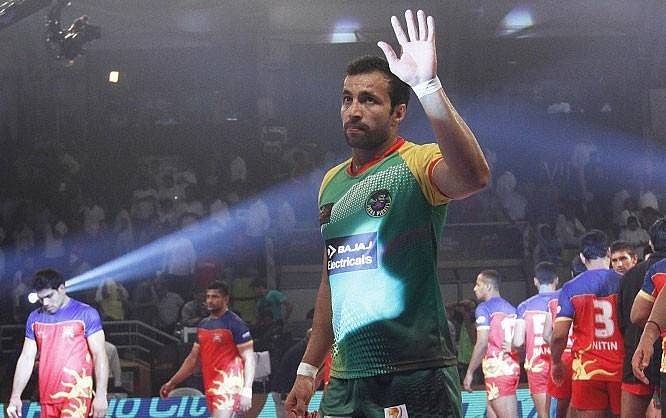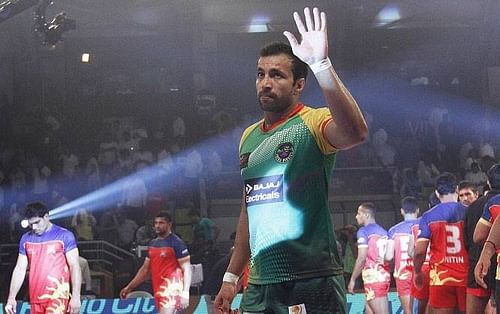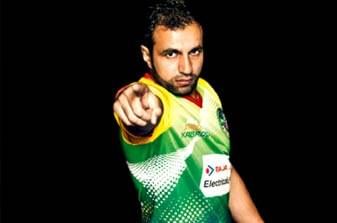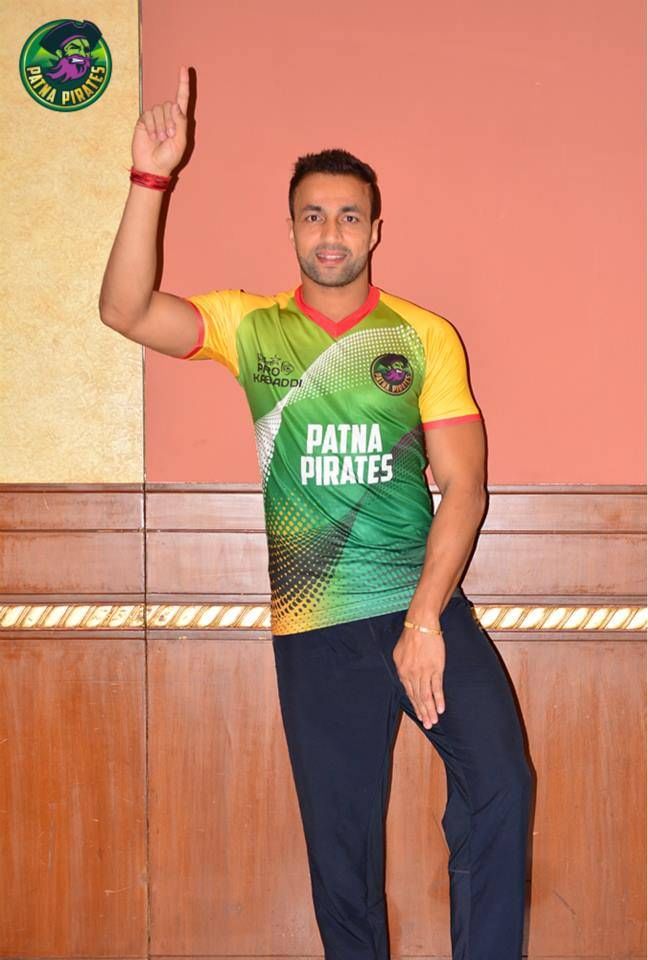
Rakesh Kumar: "Kabaddi is in my blood"
India’s national kabaddi team captain Rakesh Kumar led the Patna Pirates to a 3rd place finish at the Pro Kabaddi League (PKL) in the first season. The man from Nizampur was the most expensive player at the auction ahead of season 1. His career has seen a steady rise ever since he made his debut. He was part of the victorious Indian World Cup winning squad in 2004 and the Asian Games in 2006. He was the vice-captain in the all-conquering Indian team at the 2007 World Cup.
After he was awarded the Indian captaincy, he guided India to Gold medals at the 2010 and 2014 Asian Games. The latter was a closely-contested final with Iran at Incheon, South Korea. He is 1 of only 2 kabaddi players playing currently to have been conferred with the Arjuna Award, which he was awarded in 2011.
Rakesh Kumar spoke to Sportskeeda in an exclusive telephonic interview:
Q. You were the most expensive player in the first season. How does it feel to be recognised?
Kabaddi is our sport. The first season went very well, everyone liked it. I felt very happy that I was the most expensive player in the league. It is good for our sport that all the players – old and new – are getting the recognition they deserve.
Q. How has the Pro Kabaddi League impacted the sport of kabaddi?
I have been playing kabaddi for years, played the Asian Games as well. But, there was not a lot of recognition for us players and not many people knew the sport of kabaddi. Now, with the PKL, not just the country, but the entire world knows what kabaddi is and all its aspects. The media and Star Sports have done very well with the PKL.
I belong to a village where there is a massive craze for kabaddi. Due to the PKL, there has been an increased interest in the sport. The neighbouring villages also play a lot. It is a blessing that there are a lot of kabaddi players from my hometown who play. My seniors guided me, they took me under their wing and taught me everything. There is no coach system there. We are like a family. We teach our juniors just as our seniors taught us. In the PKL, there are about 5-6 players from my village. This is a tradition which was started by the elders and we will keep it going.
Q. How did you break the news of wanting to play kabaddi to your family?
Like I said, everyone in my village plays kabaddi. My mother was very worried because of the physicality of kabaddi as you can easily get injured as I did – a few cuts, a broken bone etc. However, my father and my brothers supported me a lot. They introduced me to the sport and although my father was a farmer, he asked me to continue playing and assured that they will support me in every way. However, a mother has a different way to care about her child and she was quite protective. But, I was NEVER discouraged by my family to take up any sport. On the contrary, I was encouraged by them to play all sports.
Q. How has the PKL helped you financially?
My father was a farmer, but he always supported me financially, no matter how difficult it was for him. There are a few players from my village in the PKL. Earlier we all used to practice together at the centre, not a stadium, but we had to put in our own money. We have progressed through our own efforts. But, now a stadium is being built back home and now we are training in an indoor hall, so there have been a lot of changes and there will be a lot more changes in the future.
Q. You hail from Nizampur and now you’ve joined Patna. How different is the kabaddi situation in both cities?
There is no court in kabaddi in Patna, but ever since the league started, there is a lot of excitement in the city. I am from Delhi, where kabaddi is massive. You can say that kabaddi is in my blood. It is the first time Patna has got a league team in any sport. It is very good for the city and a lot of people now want to take up kabaddi.
Q. Your fascination for Papaya is well-known. Please elaborate
I like other fruits as well, I eat them all, but papaya is my favourite. When we play, we sweat a lot and papaya helps in retention of the water content in the body. I eat a lot of almonds, drink a lot of milk. These are essential for a sportsperson.
Q. You are an extremely fit sportsperson. Please share your training and diet tips.
We work hard throughout the day – in the morning and evening. Being a sportsman, I have to take care of my fitness and health to avoid injuries. I eat healthy food and practice regularly to maintain fitness. Every sportsperson, not just a kabaddi player, gives a lot of care to his/her fitness.
Q. Could you tell us about your favourite move?
There is a move called the Lion Jump, which is associated with me. When you watch my matches, you will see it quite regularly. It is a move when I jump over the defenders and it helps me evade defenders who have blocked the path to my half. It is very difficult to execute and that is why I love the move.
Q. You have played for both – India and Patna Pirates. Could you tell us the difference between the teams?
There is a massive difference between India and Patna. Patna Pirates was assembled via an auction, while only the best players from the entire country are selected in the Indian team. Playing for India is a MASSIVE thing. This is a league which happens every year, but the Indian team is chosen after nearly 6 trials and the tournaments we represent India in occur once in 2 or 4 years. So, I believe the Indian team is the best as breaking into the national team is extremely difficult.
Q. Patna Pirates came 3rd in the first season. Do you think you lived upto the expectations?
See, no team comes into a tournament or a match thinking it's okay to lose. Everyone aims for the top spot. We tried our best. I believe we could have played in the final, but we made a few mistakes. It is a game, it is alright. We'll try to iron out our mistakes to reach the final and emerge as the champions this time.
Q. Patna pirates were better at attacking last season, but poor in defence. Will you be concentrating more on defending this season?
You are absolutely right – we are better at attack than defence. 80% of our points came from raiding, while 20% from defending. We are focussing on our defence now as the team will be in trouble if we don't have a strong defence. Our main focus will be on defence and we are practicing defending extensively.
Q. What changes has the team made for the second season?
As you would know, last season every team had a 14-man squad, now it is a 25-man squad to cope with injuries, form etc. We have got new players who can step up in case of injuries. Last year we started training just 15 days before the tournament, but this time, we have time on our side and we are practicing well to improve on our weaknesses.
Q. Last season, two youngsters – Ravi Dalal and Sandeep Narwal performed very well. What are your hopes for them this season?
They performed really well and they carried the team by following the instructions given to them. They proved their quality and this season they are working extremely hard to perform even better. People shouldn't get complacent, they should always look to improve on their performances. I am sure they will shine this season as well.
Q. How should a team deal with injuries to top players?
Injuries are a part and parcel of the game. However, if a player gets injured, it is the prerogative of the other players to step up. If a top player gets injured, the qualities of the coach come into the fore and the entire team has to work together towards making sure the team doesn't miss that player for the time he is injured. The 7 players that are involved have to be at their best and have to aim to win.
Q. Is there any particular match that you would call your favourite?
If I had to choose one, it would be India vs Iran in the Asian Games final. It was a very difficult match and even today when I think about that match, I get goosebumps. At one time, we were 14-15 points behind Iran. Our tactics while raiding didn't work while we were losing points when defending. But, we didn't let our heads drop and kept our morale up thinking we'll make the nation proud.
We kept on chipping away at their lead and at one point we were leading by 2 points. India has won the Asian Games 6 times already, but no match has been this close. During Iran's last raid, we had a 1-point lead and we had just 2 defenders left. So if we would have made a mistake, they would have won it, but we managed to catch their raider and win another gold medal. So, for me this is the most important match.
Q. You have won the World Cup in 2004 and 2007, Asian Games in 2006 and 2010 while you were conferred with the Arjuna Award in 2011. You have achieved so much, but which achievement do you hold the dearest?
My biggest achievement is the Arjuna Award. For a sportsperson, there is nothing bigger than that. I was very happy when I was awarded the Arjuna Award. I had fulfilled my dream and it is the biggest award for a sportsperson, so I was delighted with that.
Q. You are 33 yeard old now. What are your plans for the future?
I will play till I am fit, be it 1,2 or 3 years. A sportsperson doesn't have a shelf life. He/she can play till 40-41 if fitness permits. After my playing career, I have always had a dream of opening a good academy in my hometown. I want to provide the youngsters a good platform, who can go on to represent India and win medals for the nation. I will never leave kabaddi. It is in my blood.
Q. What do you do in your spare time?
I give time to my family as much as possible. But, once kabaddi starts, my focus is completely there
Q. What advice would you give to aspiring kabaddi players?
Now kabaddi has completely changed. It is a high-profile sport now. Let us not talk specifically about kabaddi, but about sports on a whole. So, whichever sport you choose, give your undivided attention to it, work hard and become a good player. Sometimes, you won't be a top player despite all the hard work you put in, but due to being involved in sport, at least your body stays healthy. Work hard, make your nation, parents proud.


